 W
WHenry Bidleman Bascom (1796–1850) was an American Bishop of the Methodist Episcopal Church, South, elected in 1850. He also distinguished himself as a circuit rider, pastor and Christian preacher; as chaplain to the U.S. House of Representatives; and as an editor, a college academic, and a denominational leader.
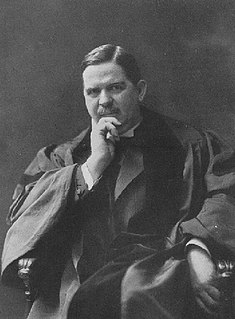 W
WSamuel Parkes Cadman was an English-born American clergyman, newspaper writer, and pioneer Christian radio broadcaster of the 1920s and 1930s. He was an early advocate of ecumenism and an outspoken opponent of anti-Semitism and racial intolerance. By the time of his death in 1936, he was called "the foremost minister of Congregational faith" by the New York Times.
 W
WFred Brenning Craddock, Jr. was Bandy Distinguished Professor of Preaching and New Testament Emeritus in the Candler School of Theology at Emory University. He was an ordained minister of the Christian Church from rural Tennessee. He was the director of the Craddock Center, a non-profit service group which operates in rural Appalachia.
 W
WHarry Croswell was a crusading political journalist, a publisher, author, and an Episcopal Church clergyman. Though largely self-educated, he received an honorary degree of A. M. from Yale College in 1817, an honorary Doctorate of Divinity from Trinity College, Hartford, Connecticut in 1831 – an institution he co-founded – established the first public lectures in New Haven, and founded an evening school for the education of adult African-Americans in the city. He was a key figure in first amendment battles over freedom of the press and religious freedom. After abandoning politics for religion, he became the much respected Rector of Trinity Church on the Green in New Haven, Connecticut, for forty-three years, growing his church and establishing seven new churches within the original limits of his parish. Though he published fourteen books, and wrote newspaper articles as an editor and journalist weekly for eleven years, he is best known as an author for being the first person to define the word cocktail in print.
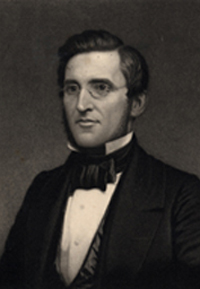 W
WJoseph Cummings was the president of Wesleyan University from 1857 to 1875, president of Northwestern University from 1881 to 1890, and had been president of the predecessor of Syracuse University from 1854 to 1857.
 W
WJonathan Edwards was an American revivalist preacher, philosopher, and Congregationalist Protestant theologian. Edwards is widely regarded as one of America's most important and original philosophical theologians. Edwards' theological work is broad in scope, but rooted in the pedobaptist Puritan heritage as exemplified in the Westminster and Savoy Confessions of Faith. Recent studies have emphasized how thoroughly Edwards grounded his life's work on conceptions of beauty, harmony, and ethical fittingness, and how central The Enlightenment was to his mindset. Edwards played a critical role in shaping the First Great Awakening, and oversaw some of the first revivals in 1733–35 at his church in Northampton, Massachusetts. His theological work gave rise to a distinct school of theology known as the New England theology.
 W
WRoderick Levi Evans is an author, lecturer, bible teacher, and Christian apologist. Evans is the founder of Abundant Truth International Ministries. Evans has written numerous books, articles, blogs, and poetry. His writings focus on orthodox Christianity, evangelical doctrines as well as charismatic/Pentecostal studies. He is best known for his teachings and books on apostolic and prophetic ministries, apologetics, doctrinal studies, as well as leadership. Evans is also a psalmist, singer-songwriter, acoustic guitarist, and poet. He currently resides in Elizabeth City, North Carolina.
 W
WWillbur Fisk was a prominent American Methodist minister, educator and theologian. He was the first President of Wesleyan University.
 W
WHenry Grew was a Christian teacher and writer whose studies of the Bible led him to conclusions which were at odds with doctrines accepted by many of the mainstream churches of his time. Among other things, he rejected the Trinity, immortality of the soul, and a hell of literal eternal torment.
 W
WJohn Wesley Hardt was an American Bishop of the United Methodist Church, elected in 1980. He also distinguished himself as a Preacher and a Pastor of Methodist Churches, as a District Superintendent, and as an author and biographer.
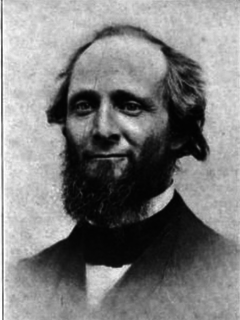 W
WErastus Otis Haven was an American bishop of the Methodist Episcopal Church from 1880 until his death. Before this, he was the president of several universities.
 W
WElijah Hedding was an American bishop of the Methodist Episcopal Church, elected in 1824.
 W
WAbiel Holmes was an American Congregational clergyman and historian. He was the father of Oliver Wendell Holmes, Sr. and grandfather of Oliver Wendell Holmes, Jr.
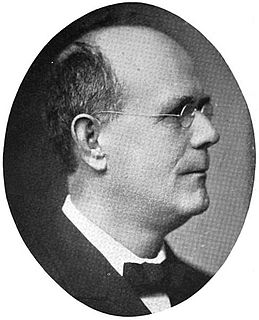 W
WElijah Embree Hoss, Sr was an American bishop of the Methodist Episcopal Church, South, elected in 1902. He also distinguished himself as a Methodist pastor, as a college professor and administrator, and as an editor.
 W
WSamuel Johnson was a clergyman, educator, linguist, encyclopedist, historian, and philosopher in colonial America. He was a major proponent of both Anglicanism and the philosophies of William Wollaston and George Berkeley in the colonies, founded and served as the first president of the Anglican King's College, and was a key figure of the American Enlightenment. Like many wealthy white colonists of the period, he was also a slave owner and slave trader.
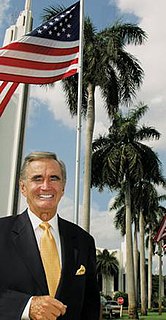 W
WDennis James Kennedy was an American pastor, evangelist, Christian broadcaster, and author. He served as the senior pastor of Coral Ridge Presbyterian Church in Fort Lauderdale, Florida, from 1960 until his death in 2007. Kennedy also founded Evangelism Explosion International, Coral Ridge Ministries, the Westminster Academy in Fort Lauderdale, the Knox Theological Seminary, radio station WAFG-FM, and the Center for Reclaiming America for Christ, a socially conservative political group.
 W
WCalvin Kingsley was an American bishop of the Methodist Episcopal Church elected in 1864.
 W
WEdward Norris Kirk, was a Christian missionary, pastor, teacher, evangelist and writer in the Presbyterian, Congregational and revivalist traditions in the US. He founded the Fourth Presbyterian Church, Albany, New York, following a schism at the Second Presbyterian Church in the same city, and later served as the first pastor of Mount Vernon Congregational Church in Boston, from 1842 to 1871, where his teaching led to the conversion of renowned evangelist Dwight L. Moody.
 W
WBishop Adna Wright Leonard I was a Methodist Bishop in Buffalo, New York and the first chairman of the Methodist Commission on Chaplains. He was killed in 1943 in a plane crash on his way to Iceland to visit Methodist chaplains and their troops.
 W
WEric Winston Ludy is an author, speaker and president of Ellerslie Mission Society. He is also the senior pastor at the Church at Ellerslie and the lead instructor at Ellerslie Leadership Training in Windsor, Colorado. Ludy is the author of more than a dozen books, many of which were co-authored by his wife, Leslie Ludy.
 W
WJohn Fullerton MacArthur Jr. is an American pastor and author known for his internationally syndicated Christian teaching radio and television program Grace to You. He has been the pastor-teacher of Grace Community Church in Sun Valley, California, since February 9, 1969. He is also the chancellor emeritus of The Master's University in Santa Clarita, California, and The Master's Seminary in Los Angeles, California.
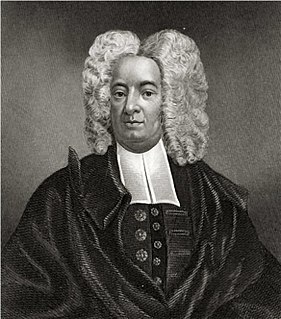 W
WCotton Mather was a New England Puritan minister, prolific author, and pamphleteer. One of the most important intellectual figures in English-speaking colonial America, Mather is remembered today chiefly for his Magnalia Christi Americana (1702) and other works of history, for his scientific contributions to plant hybridization and to the promotion of inoculation as a means of preventing smallpox and other infectious diseases, and for his involvement in the events surrounding the Salem witch trials of 1692–3. He also promoted the new Newtonian science in America and sent many scientific reports to the Royal Society of London, which formally elected him as a fellow in 1723. A controversial figure in his own day, he sought unsuccessfully the presidency of Harvard College, which had been held by his father Increase, another important Puritan intellectual.
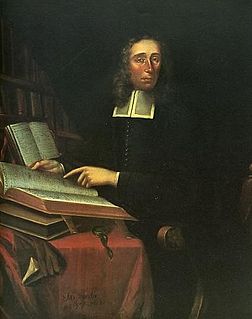 W
WIncrease Mather was an American Puritan clergyman in the Massachusetts Bay Colony and president of Harvard College for twenty years (1681–1701). He was influential in the administration of the colony during a time that coincided with the notorious Salem witch trials.
 W
WKenneth G. McLeod is a Christian apologist, radio talk show host, teacher, writer and founder of the Christian apologetics ministry: Faith Worth Defending. He is an Evangelical Christian and the author of A Well Reasoned Faith: A Rational Defense of God, Jesus and the Bible; Evidence for Skeptics: Answering the biggest Challenges to Christianity; College Christian: How to get your college degree without losing your Christian faith, and other titles.
 W
WDwight Lyman Moody, also known as D. L. Moody, was an American evangelist and publisher connected with Keswickianism, who founded the Moody Church, Northfield School and Mount Hermon School in Massachusetts, Moody Bible Institute and Moody Publishers. One of his most famous quotes was “Faith makes all things possible... Love makes all things easy.“ Moody gave up his lucrative boot and shoe business to devote his life to revivalism, working first in the Civil War with union troops through YMCA in the United States Christian commission. In Chicago, he built one of the major evangelical centers in the nation, which is still active. Working with singer Ira Sankey, he toured the country and the British Isles, drawing large crowds with a dynamic speaking style.
 W
WArthur James Moore was an American Bishop of the Methodist Episcopal Church, South (MECS), the Methodist Church, and the United Methodist Church, elected in 1930.
 W
WAsahel Nettleton was an American theologian and Evangelist from Connecticut who was highly influential during the Second Great Awakening. The number of people converted to Christianity as a result of his ministry was estimated by one biographer at 30,000. He participated in the New Lebanon Conference in 1827, during which he and Lyman Beecher opposed the teachings of Charles Grandison Finney.
 W
WBenjamin Morgan Palmer, an orator and Presbyterian theologian, was the first moderator of the Presbyterian Church in the Confederate States of America. As pastor of the First Presbyterian Church of New Orleans, his Thanksgiving sermon in 1860 had a great influence in leading Louisiana to join the Confederate States of America. After 1865 he was minister in the Presbyterian Church in the United States.
 W
WCharles Henry Parkhurst was an American clergyman and social reformer, born in Framingham, Massachusetts. Although scholarly and reserved, he preached two sermons in 1892 in which he attacked the political corruption of New York City government. Backed by the evidence he collected, his statements led to both the exposure of Tammany Hall and to subsequent social and political reforms.
 W
WNorman Vincent Peale was an American minister and author who is best known for his work in popularizing the concept of positive thinking, especially through his best-selling book The Power of Positive Thinking. He served as the pastor of Marble Collegiate Church, New York, from 1932 until 1984, leading a Reformed Church in America congregation. Peale was a personal friend of President Richard Nixon. Donald Trump attended Peale's church while growing up. He also married his first wife Ivana and attended the funerals of his parents there. According to Trump, Peale "thought I was his greatest student of all time." Peale's ideas and techniques were controversial, and he received frequent criticism both from church figures and from the psychiatric profession.
 W
WJesse Truesdell Peck was an American bishop of the Methodist Episcopal Church, elected in 1872.
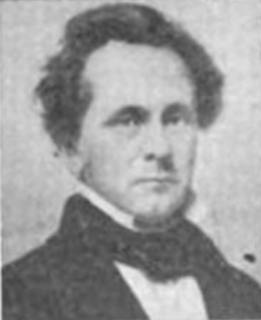 W
WGeorge Foster Pierce (1811–1884) was an American bishop of the Methodist Episcopal Church, South who served as the first president of Wesleyan College and was also president of Emory University.
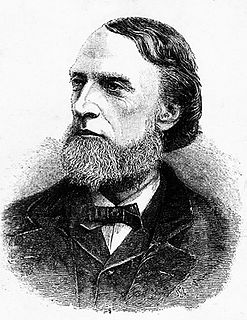 W
WArthur Tappan Pierson was an American Presbyterian pastor, Christian leader, missionary and writer who preached over 13,000 sermons, wrote over fifty books, and gave Bible lectures as part of a transatlantic preaching ministry that made him famous in Scotland, England, and Korea. He was a consulting editor for the original "Scofield Reference Bible" (1909) for his friend, C. I. Scofield and was also a friend of D. L. Moody, George Müller, Adoniram Judson Gordon, and C. H. Spurgeon, whom he succeeded in the pulpit of the Metropolitan Tabernacle, London, from 1891 to 1893. Throughout his career, Pierson filled several pulpit positions around the world as an urban pastor who cared passionately for the poor.
 W
WDelavan Leonard Pierson (1867–1952) was an American Presbyterian pastor, Christian leader, editor and writer. He was educated at Princeton University and Princeton Theological Seminary, and was licensed by the Presbytery of New Brunswick in 1894. He was the first son of Arthur Tappan Pierson who was an American Presbyterian pastor, Christian Leader, and missionary to Korea where A. T. Pierson established the Pierson Memorial Bible School in Seoul in 1912. He had a distinguished career as a writer and as a Bible school superintendent, and was editor of The Northfield Echoes and of The Missionary Review of the World.
 W
WJohn Stephen Piper is a theologian and pastor who is the founder and senior teacher of desiringGod.org, and chancellor of Bethlehem College & Seminary in Minneapolis, Minnesota. Piper taught Biblical Studies at Bethel University for six years (1974-1980) and then served as Pastor for Preaching and Vision of Bethlehem Baptist Church in Minneapolis, Minnesota, for 33 years (1980-2013). His books include ECPA Christian Book Award winners Spectacular Sins, What Jesus Demands from the World, Pierced by the Word, and God's Passion for His Glory, and bestsellers Don't Waste Your Life and The Passion of Jesus Christ. The organization Desiring God is named for his book Desiring God: Meditations of a Christian Hedonist (1986).
 W
WEbenezer Porter, D.D., was an American minister and writer.
 W
WRobert Harold Schuller was an American Christian televangelist, pastor, motivational speaker, and author. In his five decades of television, Schuller was principally known for the weekly Hour of Power television program, which he began hosting in 1970 until his retirement in 2010. Schuller began broadcasting the program from the Neutra Sanctuary, with the encouragement of longtime friend Billy Graham after Schuller visited him in 1969. He was also the founder of the Crystal Cathedral in Garden Grove, California, where the Hour of Power program was later broadcast.
 W
WMatthew Simpson was an American bishop of the Methodist Episcopal Church, elected in 1852 and based mostly in Chicago [Correction: Philadelphia. Simpson and his wife were fixtures of Society Hill]. During the Reconstruction Era after the Civil War, most evangelical denominations in the North, especially the Methodists, were initially strong supporters of radical policies that favored the Freedmen and distrusted the Southern whites. However by the late 1860s in border state conferences, the MEC North moved well away from their work with the Freedmen's Bureau and often sided with the grievances of Southern white members. Bishop Simpson played a leading role in mobilizing the Northern Methodists for the cause. His biographer calls him the "High Priest of the Radical Republicans."
 W
WRobert S. Smith was an American Catholic priest, author, and educator. His interests ranged from philosophy and theology to the ethics of medical care to interfaith dialogue. Smith's homilies explored the mystery and challenge of religious faith, the relationship between modern culture and the struggle to pursue Christian life, and the paradoxical, complex nature of the spiritual journey. He founded the Sophia Center, devoted to engendering discourse among diverse scientific, cultural, and religious perspectives. He was the author of In the Image of God.
 W
WDavid de Sola Pool was the leading 20th-century Sephardic rabbi in the United States. A scholar, author, and civic leader, he was a world leader of Judaism.
 W
WJoshua Soule was an American bishop of the Methodist Episcopal Church, and then of the Methodist Episcopal Church, South.
 W
WDavid Swing was a United States teacher and clergyman who was the most popular Chicago preacher of his time.
 W
WPaul Johannes Tillich was a German-American Christian existentialist philosopher and Lutheran Protestant theologian who is widely regarded as one of the most influential theologians of the twentieth century. Tillich taught at a number of universities in Germany before immigrating to the United States in 1933, where he taught at Union Theological Seminary, Harvard Divinity School, and the University of Chicago.
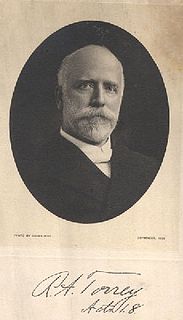 W
WReuben Archer Torrey was an American evangelist, pastor, educator, and writer. He aligned with Keswickian theology.
 W
WErnest Lynn Waldorf was an American bishop of the Methodist Episcopal Church, elected in 1920.
 W
WBeverly Waugh (1789–1858) was an American who was a Methodist Pastor, Book Agent, and Bishop of the Methodist Episcopal Church, elected in 1836.
 W
WHazen Graff Werner was a Bishop of The Methodist Church and The United Methodist Church, elected in 1948.
 W
WReverend Samuel Willard was a colonial clergyman. He was born in Concord, Massachusetts, graduated Harvard in 1659, and was minister at Groton from 1663–1676, whence he was driven by the Indians during King Philip's War. Willard was pastor of the Third Church, Boston from 1678 until his death. He opposed the Salem witch trials, and served as acting president of Harvard from 1701. He published many sermons; the folio volume A Compleat Body of Divinity was published posthumously in 1726.
 W
WRoger Williams was a Puritan minister, theologian, and author who founded Providence Plantations, which became the Colony of Rhode Island. He was a staunch advocate for religious freedom, separation of church and state, and fair dealings with Native Americans, and he was one of the first abolitionists.
 W
WWilliam Henry Willimon is an American theologian and bishop in the United Methodist Church, retired, who for eight years served the North Alabama Conference. He is currently Professor of the Practice of Christian Ministry and Director of the Doctor of Ministry program at Duke Divinity School. He is former Dean of the Chapel at Duke University and is considered by many as one of America's best-known and most influential preachers. A Pulpit & Pew Research on Pastoral Leadership survey determined that he was one of the two most frequently read writers by pastors in mainline Protestantism alongside the Roman Catholic writer Henri Nouwen. His books have sold over a million copies. He is also Editor-At-Large of The Christian Century. His 2019 memoir Accidental Preacher was released to wide acclaim, described by Justo L. Gonzalez as "An exceptional example of theology at its best."
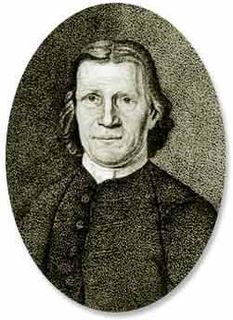 W
WDavid Zeisberger was a Moravian clergyman and missionary among the Native Americans tribes who resided in the Thirteen Colonies. He established communities of Munsee (Lenape) converts to Christianity in the valley of the Muskingum River in Ohio; and for a time, near modern-day Amherstburg, Ontario.